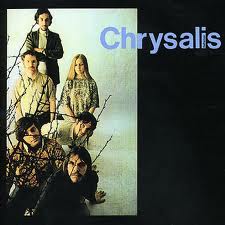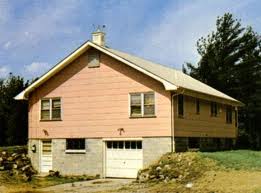The recent death of
Levon Helm brought back to mind the two decades I spent at the house he and his Bandmates made famous:
Big Pink. I had some of the best times, and years, of my life there. And I even got to meet Levon.
In 1976, I moved to Woodstock to live with my girlfriend Anne Dinger. She had finally left her abusive husband the year before and was living in a small cottage on Orchard Lane. All the materials of my business, my stock of LPs for sale and all my office equipment, were still in a small trailer in Phoenicia, next to the larger trailer I had occupied with my ex-wife, and I had to commute every day.
The house on Orchard Lane was for sale, and Anne cooperated graciously with the realtor who was handling the property in arranging showings. When it finally sold, the realtor promised to find us a good place to rent, one with good living quarters and enough space to run my business. The first time she took us up to Stoll Road, in Saugerties, I was intimidated by the curvy, uphill road, which I thought would be hard to drive in snow. It was, and eventually I became accustomed to the two or three days every winter when I was stuck in the house.
But the house itself was ideal. It was roomy enough for both Anne’s and my grand pianos (she put hers in the upstairs apartment). And the basement, the famous basement where the “Basement Tapes” were recorded, had more than enough space for my business needs. Lots more. Also, I learned that after the Band members had left the house, it had been rented by a guitar maker, who had used the basement as his workshop. (I used his worktable as a packing table for years.) This house wants to have music in it, I thought.
The availability of all that space encouraged me to expand my LP stock greatly, and eventually it even filled the garage. I had wonderful times there, the first few years. There were frequent parties with music. I once hosted a house concert of Indian music. I got a lot of work done and met friendly neighbors, among whom I remember most the loony Marion Gold and his caviar and the tall, beautiful cellist Ann Sheldon who played electric music with rock groups and died in a puzzling car crash. My neighbor and friend David turned sour and became impossible, but his wife Geraldine Barton, now remarried, remains one of my closest friends.

People often came to see the house. Whenever it was possible I always let them in and took them around. I knew it meant a lot to some of them. I remember one stoner who showed up one Sunday afternoon when I was standing outside. “Hey, man,” he said, “is Dylan here? Is The Band here?” I explained to him that they had departed years earlier. “Oh, wow,” he replied. “I came here to get inspiration for my music.” One Israeli came to look at the house and asked if I knew where to find the leader of the band Chrysalis, Spider Barbour. He was astonished when I told him that Spider was a friend. We called Spider and he invited the guy over; it turned out he had come from Israel largely in hopes of meeting Spider.
One tourist from Japan disappeared into the basement. After an hour or so I realized he hadn’t said goodbye so I went downstairs to see if he was still there. He was lying on the floor, on his back, taking pictures of the ceiling.After Anne and I separated, I went through three years of loneliness and craziness, including a brief relationship with a toxic alcoholic.
It was at Big Pink, though, that I began my long love with Tara McCarthy, a woman so splendid that I often wondered why she had picked me for her companion.
I lived at Big Pink through the decade I spent doing radio programs for WDST, back in the day when it welcomed enough diversity to broadcast my successful classical music series.
On various occasions, I met all the surviving members of
The Band. Richard Manuel, who committed suicide, had never come to the house while I was there, although I did get his autograph on my copy of “Music from Big Pink” when I went to hear The Band in Poughkeepsie. Garth Hudson, Rick Danko, and Levon Helm all came to the house to take photographs, Rick several times, and I had friendly conversations with all of them. Since I was still writing songs then, I joked with Rick that I was going to record an album called “More Music from Big Pink,” and I invited him to play on it. “Sure,” he said. (I did issue a CD on my own label by Spider Barbour and the Curmudgeons, with a cover photo shot outside the house.) Robbie Robertson was estranged from the other members of the group, but shortly before I moved he came by with a camera crew to shoot a segment for “CBS Sunday Morning.” CBS’s reporter, who was trying out arts reporting, was the great jazz singer
Cassandra Wilson. She signed a laserdisc of hers for me.
My relationship with my landlord at Big Pink wasn’t comfortable. Michael, a bass player, was one of the most unpleasant people I’ve met, and many of my phone conversations with him ended with one of us hanging up on the other. (His wife Elizabeth was usually more reasonable.)
Living in the house for 21 years, I was able to see how little maintenance Michael was willing to do on it. When something needed painting, Michael told me he would pay for the paint. Only. So when he decided to sell the house, although I was in a position to buy it, I decided not to. (He first offered it at a high premium price because it was Big Pink, but got no takers. Apparently nobody wants a house as a souvenir.) It would have taken at least $10,000 in repairs. So I bought another house three miles away, and said goodbye to Big Pink with some regret. I’ve never been back.
Ironic postscript: The night of Barack Obama’s inauguration, I attended a big party at
New World Home Cooking. In some kind of drawing, I won a pair of tickets to one of Levon Helm’s Midnight Rambles, concerts he held in the recording studio next to his house. It was a considerable prize, since tickets to those concerts cost $100 each. But I forgot all about it until I heard that Levon had died.

